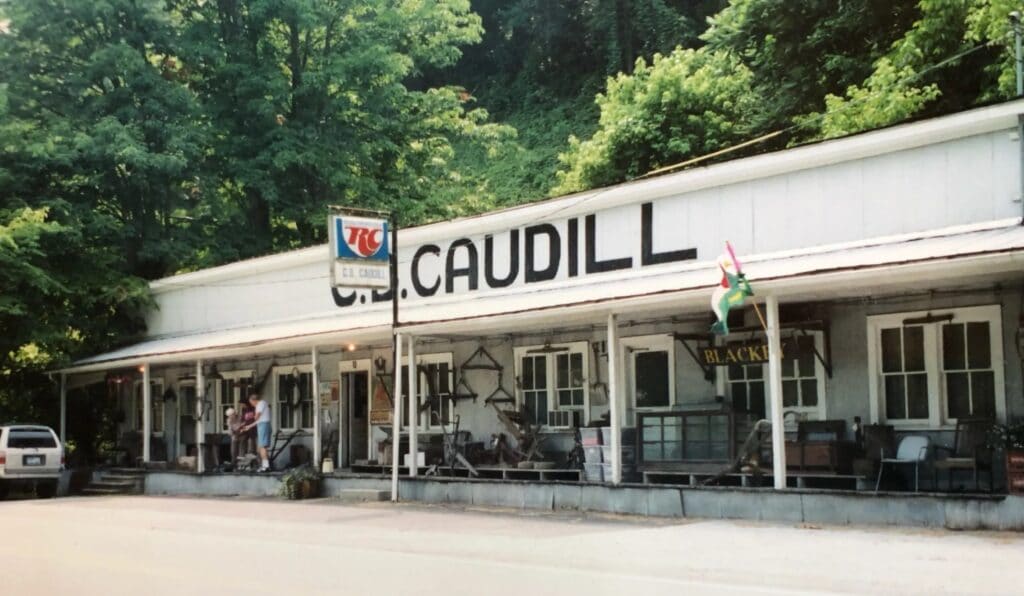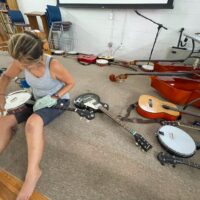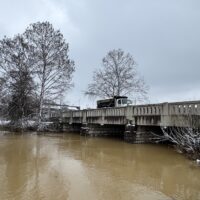This article is taken from a speech that Dee Davis, publisher of the Daily Yonder, delivered June 21, 2022, to the National Rural Grocery Summit in Wichita, Kansas.
+++
Thanks for having me. When I was asked to come, the first thing I thought of was a story Willie Snow Ethridge told me once. My son is named Willie, and my 3-year-old granddaughter is named Geneva Snow, both after Willie Snow, Geneva’s great-great grandmother. Willie Snow was an author of 16 books and a much sought-after speaker all around the country.
She was also wife of Mark Ethridge, the editor of the Louisville Courier-Journal. In Louisville the first week of May is high holiday time, because that is when they run the Kentucky Derby. Normal business stops and the town is filled with out-of-town guests – visiting dignitaries, diplomats, writers, reporters, actors, and musicians. Well, there was this one Derby where Willie was having a great time in the midst of all the festivities, the parties, the dancing, hanging out with the hoi polloi, but looming for her was a Monday luncheon speaking engagement in Wichita. She spent the week berating herself for agreeing to a speaking engagement on the heels of Derby weekend. But Monday morning came, and she dutifully made her way to the airport to fly off to Kansas. Willie said the whole time she was muttering to herself, “Wichita! Wichita! Who even knew there was a Wichita? Why would I ever go to a place called Wichita? Why is there even such a place called Wichita?”
But she landed just before noon where a delegation from the women’s club dressed in their spring finery met her at the plane so they could rush her to the luncheon. Willie said the first thing she heard was, “Oh, Mrs. Ethridge, how wonderful it is have you back again. We all so loved your speech last year, and we can’t wait to hear this year’s speech.”

Willie said to herself, “This year’s speech? This year’s speech? I only had the one speech.”
Well I am glad to be here in Wichita. I am reasonably sure I was not here last year. I am pretty sure that I have spent the last two years on my couch watching murder mysteries. But if any of you have seen me before, and what I have to say sounds familiar, please understand. It has been a rough patch.
The part of Kentucky I come from is not the horse racing and bourbon-by-the-barrel fancy part of Kentucky – where movie stars and potentates come to visit. I am from the Appalachian Mountains, coal mining part of Kentucky where we are probably known for playing banjos and being poor as much as for anything else. We don’t own race horses, and if we do keep bourbon, it is in convenience-sized containers ideal for medicinal use.
About a hundred years ago the railroads came in and the Appalachian coal fields began to boom. What had been a somewhat sustainable gardening and trade economy, hogs and logs, was replaced by industrial coal mining to fuel the country’s growth. That quickly meant hundreds of thousand of miners coming into the region, new housing to shelter them, and food for them to eat. There were passenger trains, but few paved roads to speak of. Not everywhere had electricity. Coal companies built camps near the mines so their miners could walk to work. My grandfather, Morton Carte, came in to work as a salesman for Bowman, Watts Wholesale Grocery. That was before my time, but I have been told by those around back then that he was a legendary salesman, that he could go out in a day from camp to camp and write enough orders to fill two railroad cars with food and dry goods.
And then and there, life in East Kentucky was not so different from hard-rock mining camps in Colorado and California, or from lumber camps in Washington and Oregon, or oil-patch towns in Texas, Oklahoma, and Western Kansas, or small farming communities in this part of Kansas, Indiana, Minnesota or South Dakota. Half the country lived on a rural route or in a small village. The small towns full of promise all had a school, a post office, a doctor, maybe even a picture show, and a grocery store where you could buy or trade for much more than meat and potatoes, sugar and salt.
One of the great joys in my life was hanging out in the small country stores that hung on when the forces of modernity began to eliminate their market advantages. As a delivery boy in high school, I often stood at the counter eating pickled baloney, sipping on a Nehi, and learning local history, politics, and who was above and below reproach. My favorite grocery of them all was the C.B. Caudill Store in Blackey, Kentucky, run by Joe and Gaynell Begley. A visit there was like a trip to the museum. They sold those rings you put in your hog’s nose so he won’t root. They come in different sizes. Who knew? And five- and six-feet breast augers lined against the wall. A breast auger is the tempered steel tool men would use, like a brace-and-bit wood drill, except it is so big you need to push on it with your breast to penetrate the coal face to fill your bucket and get fuel for the night.
Gaynell was C.B. Caudill’s daughter, who had gone to Berea College and the University of Chicago but come back to Blackey to keep shop when her daddy needed her. Studs Terkel in American Dreams Lost and Found quotes Gaynell explaining, “A transaction here is not entirely economic. It’s a matter of friendship and socializing for a minute. That’s as important to me as getting that quarter.”
And Joe Begley was Lincoln reincarnate, long and lanky, and full of yarns. Every reporter in the War on Poverty era made a pilgrimage to the store to hear Joe’s thoughts on the news of the day. Twice he was flown to the White House to be part of Rose Garden bill signings. Here’s Joe:
“I been a deputy sheriff for probably 29 years. I put a lot of people in jail. Recently, I helped get some escapees. They called me and said: ‘Joe Begley, we don’t want to be killed. We want you to come and get us. We know you won’t beat us up, you won’t treat us bad.’ I took ’em to jail. Some of the best friends I got is some of the people I’ve put in jail.”
Joe made the point that he did not believe in black jacking, or pistol whipping, just telling people what they did wrong and treating them decent.
But the world changes. You have to hang on to the moments you’re given. The C.B. Caudill Store lasted well into the Walmart era. A transaction still may be an act of friendship, but if you have to charge a quarter more for a carton of milk, or a dime more for a gallon of gas, there comes a time when friendship is taxed, where it does not matter how long you let Aunt Gert feed three kids on credit or that you could find No. 7 snout ring for your hog.
The pressures of a globalized economy push hard on rural places everywhere. Where we once made our livings extracting minerals, sawing logs, and cultivating the soil, we still live in the cultural shadow of those endeavors, we celebrate those legacies, we even identify ourselves by what we used to do – this is farm country, we are from the coal fields – but we struggle to thrive. We have lost a lot of towns. The country-sides have lost people. But that does not have to be us losing purpose. Victor Hugo said, “The greatness of a people is no more determined by their numbers, than the greatness of a man is by his height.”
Joe Begley said, “You don’t give up, because a handful of people can win in this country. A handful of people in the beginnin’ saved this country.”
We have tried a lot of things to revive rural economies. Often making speculative bets with shaky results. We’ve built spec buildings on spec industrial parks in most every county, stacked up tax incentives for investors we have never laid eyes on, we have widened perfectly good highways, hired silver-tongued industrial recruiters, and constructed all manner of prisons to house urban criminals. That is us betting on more crime and violence in cities so we can build a more tranquil life in the country. Every rural region is going to be the next Silicon something — hollow, prairie, bayou — and every state is vying to create biomass central to fill a demand that has not yet manifested itself. In Kentucky right now, the General Assembly has been moving regulatory and environmental roadblocks to replace the coal industry with crypto currency mining. Ask me how that is working out. We pretty much bet on everything but ourselves. And we fatten frogs for snakes.
There are other ways forward. One: We can build the towns we want to live in. They don’t have to be big. They don’t have to be the next someplace else. They can just be cool places to live. At my work we say smarter, greener, more inclusive, because nobody would listen to us if we just said cooler.
People want to live where they are connected, connected to each other and connected to the world in the way the technology promised, but has been slow to deliver. We develop a sense of belonging from what we do together. Play basketball in the school lot. Walk a trail. Paint a mural. Join a choir. When we pitch in, when we fix what we broke, we are citizens building those places we want to live in.
Richard Florida wrote about creative capital and how cities compete to bring in talented college kids, because they understand the economy of the future is what those kids will create and not building a maximum-security prison or stealing a widget plant from Ohio.
Of course, there is a lot to making our towns right. Our schools have to work, and we need primary health care for when I run over my foot with a lawnmower. It is going to happen. And I am going to need someone who can staunch the bleeding in time.
Also critical to “cooler” is food. The word culture comes to us from agriculture. In my town there was a huge stink years ago when the fallow industrial park that had been providing groundhog and kudzu habitat, suddenly got used for a super market and a primary care facility. Many of us thought with a declining coal industry, we needed an industrial site so someone could build a plant. But the reality is that the health care facility now employs far more people at measurably higher wages, and brings in far more income than most any small industry that would have been placed there to turn our economy around. That facility keeps far more of us healthier. And the grocery store also employs more people than a widget plant and makes us happier. Having a good grocery does more to make people want to live in a place than about anything an industrial recruiter is going to write in a brochure.
I don’t want to take the time to tick every box here, but I want to say something about making our towns more inclusive. There have been a lot of small towns throughout the ages that have punched above their weight, but a compelling characteristic in a many of those places was that they were a crossroads. They welcomed travelers, fed them and sheltered them and swapped stories. Nazareth was a town of 400 people 2,000 years ago, but it was a crossroads between people of different languages, cultures, and faiths. My town’s sign says home to 1,536 friendly people and two grouches. Two hundred fifty years ago Williamsburg, Virginia, was also a town of 1,500 when delegates of the House of Burgesses stopped by the Raleigh Tavern for an ale on Friday night and dreamed up the idea of this nation.
If we are welcoming ideas and diverse experience, we are taking a necessary step. And if we want to grow and repair our small towns and imagine the places we want to live, then the act of welcoming is critical.
It is not just welcoming strangers. We need to acknowledge those among us already who don’t feel welcome. Those who could help us dig out of the ditch, if we could ask for and accept their help. Sometimes those people feel marginalized. Sometimes those folks feel abandoned or rejected because of race, income, sexual orientation, or their own disconnection, but we need them in the ditch with us.
Years ago we were filming Senator Tom Daschle in Lake Preston, South Dakota. They were about to lose their drug store. A pharmacist was retiring, shutting down, and the loss would mean townspeople driving another half hour to get medicine. Citizens came together and figured out how to finance a graduating pharmacy student so she could buy the store. A transaction is an act of friendship.
I recall what Senator Daschle said, that what he liked about small towns was that everyone was needed. You are needed for the ball team, for the band. You are needed for the library board or the city council. No one is expendable.
But that is not just true in small towns. Who is not necessary? From Boulder to Birmingham, from Bakersfield to Buffalo’s Top Friendly Market, we are struggling with opening up, risking ourselves, greeting strangers, trusting outsiders, and at the same time trying to keep our people safe. It may be the challenge of our day, and there in the hardest time in a hundred years, we asked the grocers to stand on the front lines for all of us – to face the pandemic, to sort the science, to manage all the meanness, and give our towns the sustenance we needed to hang on, get better. Like those folks in health care, it was not fair, but it is essential, if we are going to build a society where neighbors are not expendable. Expendable is not sustainable.
And I want to say that two people who worked in the grocery I shop died in the sickness. The names go in the paper, but maybe those are the names that should go on bridges, wall plaques, and historical markers.
I want to talk about one more thing. It is how we understand our towns in terms of trajectory. I think it is an important part getting to what’s next.
When I was starting out, 25 years old, I was on a film crew, and it was my job to interview Robert Penn Warren. Because he was a novelist and critic from tiny Guthrie, Kentucky, I wanted to talk to him about sense of place in his art. I was not skilled and had a hard time hearing what he tried to tell me. He said that we were in an era where people were losing their sense of place in time. He made the case that when we lose our sense of how we got here, we lose our perspective of our own journey in time, and to a degree what is possible for us to do in our moment.
And what is true for us may also essential for us to understand about our communities. Not that the past is determinative. Not that we can gloss over the transgressions of history. But that the price of the ticket going forward is being able to respect the meaning of our towns in time. In the way our own mortality circumscribes our journey, our accomplishments, our failures, our towns face futures beyond this year’s price of fuel, shortages of baby formula, or who wins the next governor’s race. If we are going to build a future that people will want to live in, we also have to understand a trajectory that outlasts us.
When I was a boy, my grandfather, the former grocery salesman, asked me to help in his garden. I think he wanted my company more than my help. I was not good in the garden. He asked me to help him pick peas, and when I started jerking around, he came over and placed my hand in his, and showed me how to grasp the pod, let the vine fall between my fingers, and use my thumb to take the pea. I did not think of that for 50 years. Then one day I went out into the garden, and my 3-year-old grandson Eliot followed me. And when I took his hand to show him how to pick the pea, I was overwhelmed with a sense of belonging — to a family, a community, to a place, sure, but also to purpose. To a place in time.
The job to make our towns better, cooler is not easy. But it is essential. And it’s good work. Who doesn’t want to be in the handful that makes a difference?
Dee Davis is publisher of the Daily Yonder and president of its parent organization, the Center for Rural Strategies. He lives in Whitesburg, Kentucky. This article first appeared on The Daily Yonder and is republished here under a Creative Commons license.
Dee Davis is president of the Center for Rural Strategies and publisher of The Daily Yonder, a nonprofit newsroom that provides news, commentary and analysis about and for rural America. It is the news platform for the Center for Rural Strategies, which has offices in Whitesburg, Kentucky, and Knoxville, Tennessee. Davis is on twitter @iamflyrock.






